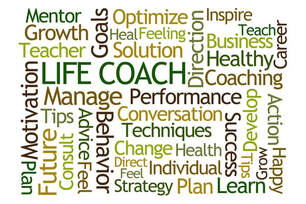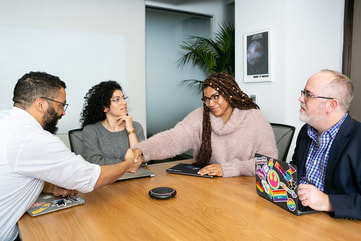Life Coaching

Some of us experience life challenges that leave us feeling stressed, anxious, and unsure of where to turn for help. Life coaches help you clarify your goals and identify any obstacles holding you back from achieving those goals. Coaching helps you identify what is going on in your own brain and helps you recognize where you are stuck and how to change. A life coach is like having a partner who will call you out when you need it and support and believe in you through your journey.
Who benefits from a life coach? Almost anyone can benefit from a life coach. People who are feeling lost, anxious, or are struggling through everyday life without feeling like they have direction can benefit from coaching. Typical clients may or may not be struggling with issues from their past, but definitely are experiencing issues in the present that are stopping them from becoming who they want to be. A coach will work with clients to clarify those issues and help to remove the mental roadblocks stopping them from achieving their goals, in addition to giving them skills to change unhelpful patterns. For clients who do not wish to discuss their past, coaching may be a better option for them.
How does coaching differ from traditional therapy? Simply put, therapy takes a clinical or diagnostic look at the emotional and behavioral interplay between the past, present and future, whereas coaching focuses on today’s struggles and problems, current issues, and future goals. Coaching is short-term, and clients usually see results in 8-12 sessions.
For more information or to schedule a Life Coaching appointment, call Stacy Zaharias at 224-333-0267 option 105.
Who benefits from a life coach? Almost anyone can benefit from a life coach. People who are feeling lost, anxious, or are struggling through everyday life without feeling like they have direction can benefit from coaching. Typical clients may or may not be struggling with issues from their past, but definitely are experiencing issues in the present that are stopping them from becoming who they want to be. A coach will work with clients to clarify those issues and help to remove the mental roadblocks stopping them from achieving their goals, in addition to giving them skills to change unhelpful patterns. For clients who do not wish to discuss their past, coaching may be a better option for them.
How does coaching differ from traditional therapy? Simply put, therapy takes a clinical or diagnostic look at the emotional and behavioral interplay between the past, present and future, whereas coaching focuses on today’s struggles and problems, current issues, and future goals. Coaching is short-term, and clients usually see results in 8-12 sessions.
For more information or to schedule a Life Coaching appointment, call Stacy Zaharias at 224-333-0267 option 105.
Divorce Coaching

If you are going through a divorce, it is crucial that you be able to express your wants and needs for yourself and for your children without getting overwhelmed by the legal process or your spouse's emotions and behaviors. A Divorce Coach is a professional who is trained to help you manage, cope with, diffuse or redirect the stress, anger, frustration, pain, sadness, and exhaustion that often pervades the divorce process and sometimes interferes with positive outcomes. Having someone at your side can help you to make effective decisions and manage the parts of the divorce process that are not typically part of the attorney's role.
Is it possible to have a good divorce?
We are not attorneys and do not practice law. However, we recognize that divorce is more than a legal division of assets and that some people need assistance with the changes in the emotional and co-parenting aspects in addition to knowing their legal rights. We do work with attorneys to provide you with a cost-effective, comprehensive approach to settling your differences by paying special attention to the emotional and communication struggles that sometimes complicate an already challenging process.
In addition, while coaching is not therapy, a Divorce Coach also can work with couples together to help you both to communicate more effectively through the divorce and beyond, which promotes better relationships and healthier adjustments for you and your children. Sessions can be individual or joint, and the Divorce Coach can be a part of the four-way meetings with collaborative attorneys to help coach you through the management of emotions, behaviors and communication patterns while you actively negotiate your marital settlement agreement with the attorneys.
Divorce Coaches are part of the Collaborative Divorce team, which offers an alternative to the traditional litigation approach to divorce, though you can benefit from the services of a Divorce Coach even if you choose to litigate your divorce. When you have a team that is working for you, it is possible to minimize the losses and actually have a good divorce.
For more information on the collaborative divorce process: www.collablawil.org or call Michelle Green, LCSW, 224-333-0267 option 102 or email [email protected].
In addition, while coaching is not therapy, a Divorce Coach also can work with couples together to help you both to communicate more effectively through the divorce and beyond, which promotes better relationships and healthier adjustments for you and your children. Sessions can be individual or joint, and the Divorce Coach can be a part of the four-way meetings with collaborative attorneys to help coach you through the management of emotions, behaviors and communication patterns while you actively negotiate your marital settlement agreement with the attorneys.
Divorce Coaches are part of the Collaborative Divorce team, which offers an alternative to the traditional litigation approach to divorce, though you can benefit from the services of a Divorce Coach even if you choose to litigate your divorce. When you have a team that is working for you, it is possible to minimize the losses and actually have a good divorce.
For more information on the collaborative divorce process: www.collablawil.org or call Michelle Green, LCSW, 224-333-0267 option 102 or email [email protected].
Midway Mediation & Counseling
1095 Pingree Rd., Suite 221, Crystal Lake, IL 60014
(224) 333-0267 [email protected]
1095 Pingree Rd., Suite 221, Crystal Lake, IL 60014
(224) 333-0267 [email protected]
